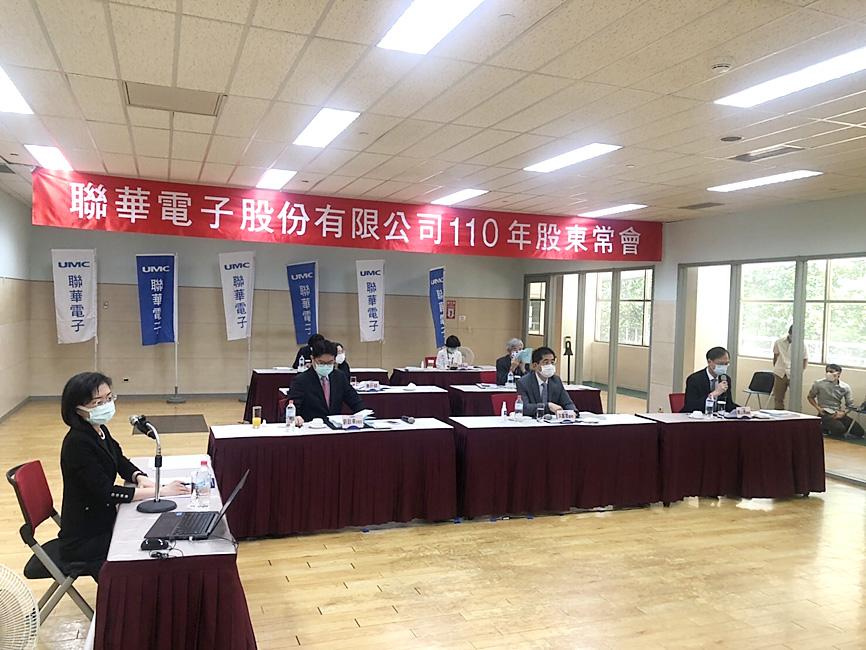The global semiconductor shortage is expected to last until 2023 as the COVID-19 pandemic boosts demand for chips for automobiles and smart home devices, United Microelectronics Corp (UMC, 聯電) copresident Chien Shan-chieh (簡山傑) said yesterday.
Speaking at the company’s annual general meeting in Hsinchu, Chien said that while the COVID-19 pandemic has had an adverse impact on the global economy, digital transformation has accelerated growth in the semiconductor industry.
Chip supply would fall short of demand and only worsen in the short term, with a shortage of 8-inch and 12-inch wafers set to be the most severe, Chien said.

Photo: Grace Hung, Taipei Times
As demand continues to soar, the global chip shortage is likely to last beyond next year until 2023, he said.
To solve the problem, the key is to increase capacity, Chien said, but added that even with chipmakers investing in fabs to expand capacity, it would take until 2023 for more chips to be produced.
UMC’s revenue grew 26 percent in US dollar terms last year, while its operating income surged to NT$22.01 billion (US$786.27 million), reflecting solid utilization rates across both 8-inch and 12-inch facilities, and optimization of the company’s blended product mix, he said.
Of particular note has been the company’s enhanced 12-inch product mix, which is primarily a result of the substantial pickup in the 28-nanometer wafer business, as well as the successful integration of 12-inch operations at its Japanese subsidiary United Semiconductor Japan Co, he added.
Shareholders of UMC, the world’s third-largest contract chipmaker, yesterday during the online meeting approved a plan to distribute a NT$1.6 cash dividend.
The company last year posted consolidated revenue of NT$176.82 billion, or earnings per share of NT$2.42, up 19.3 percent year-on-year.

CHIP RACE: Three years of overbroad export controls drove foreign competitors to pursue their own AI chips, and ‘cost US taxpayers billions of dollars,’ Nvidia said China has figured out the US strategy for allowing it to buy Nvidia Corp’s H200s and is rejecting the artificial intelligence (AI) chip in favor of domestically developed semiconductors, White House AI adviser David Sacks said, citing news reports. US President Donald Trump on Monday said that he would allow shipments of Nvidia’s H200 chips to China, part of an administration effort backed by Sacks to challenge Chinese tech champions such as Huawei Technologies Co (華為) by bringing US competition to their home market. On Friday, Sacks signaled that he was uncertain about whether that approach would work. “They’re rejecting our chips,” Sacks

NATIONAL SECURITY: Intel’s testing of ACM tools despite US government control ‘highlights egregious gaps in US technology protection policies,’ a former official said Chipmaker Intel Corp has tested chipmaking tools this year from a toolmaker with deep roots in China and two overseas units that were targeted by US sanctions, according to two sources with direct knowledge of the matter. Intel, which fended off calls for its CEO’s resignation from US President Donald Trump in August over his alleged ties to China, got the tools from ACM Research Inc, a Fremont, California-based producer of chipmaking equipment. Two of ACM’s units, based in Shanghai and South Korea, were among a number of firms barred last year from receiving US technology over claims they have

It is challenging to build infrastructure in much of Europe. Constrained budgets and polarized politics tend to undermine long-term projects, forcing officials to react to emergencies rather than plan for the future. Not in Austria. Today, the country is to officially open its Koralmbahn tunnel, the 5.9 billion euro (US$6.9 billion) centerpiece of a groundbreaking new railway that will eventually run from Poland’s Baltic coast to the Adriatic Sea, transforming travel within Austria and positioning the Alpine nation at the forefront of logistics in Europe. “It is Austria’s biggest socio-economic experiment in over a century,” said Eric Kirschner, an economist at Graz-based Joanneum

BUBBLE? Only a handful of companies are seeing rapid revenue growth and higher valuations, and it is not enough to call the AI trend a transformation, an analyst said Artificial intelligence (AI) is entering a more challenging phase next year as companies move beyond experimentation and begin demanding clear financial returns from a technology that has delivered big gains to only a small group of early adopters, PricewaterhouseCoopers (PwC) Taiwan said yesterday. Most organizations have been able to justify AI investments through cost recovery or modest efficiency gains, but few have achieved meaningful revenue growth or long-term competitive advantage, the consultancy said in its 2026 AI Business Predictions report. This growing performance gap is forcing executives to reconsider how AI is deployed across their organizations, it said. “Many companies